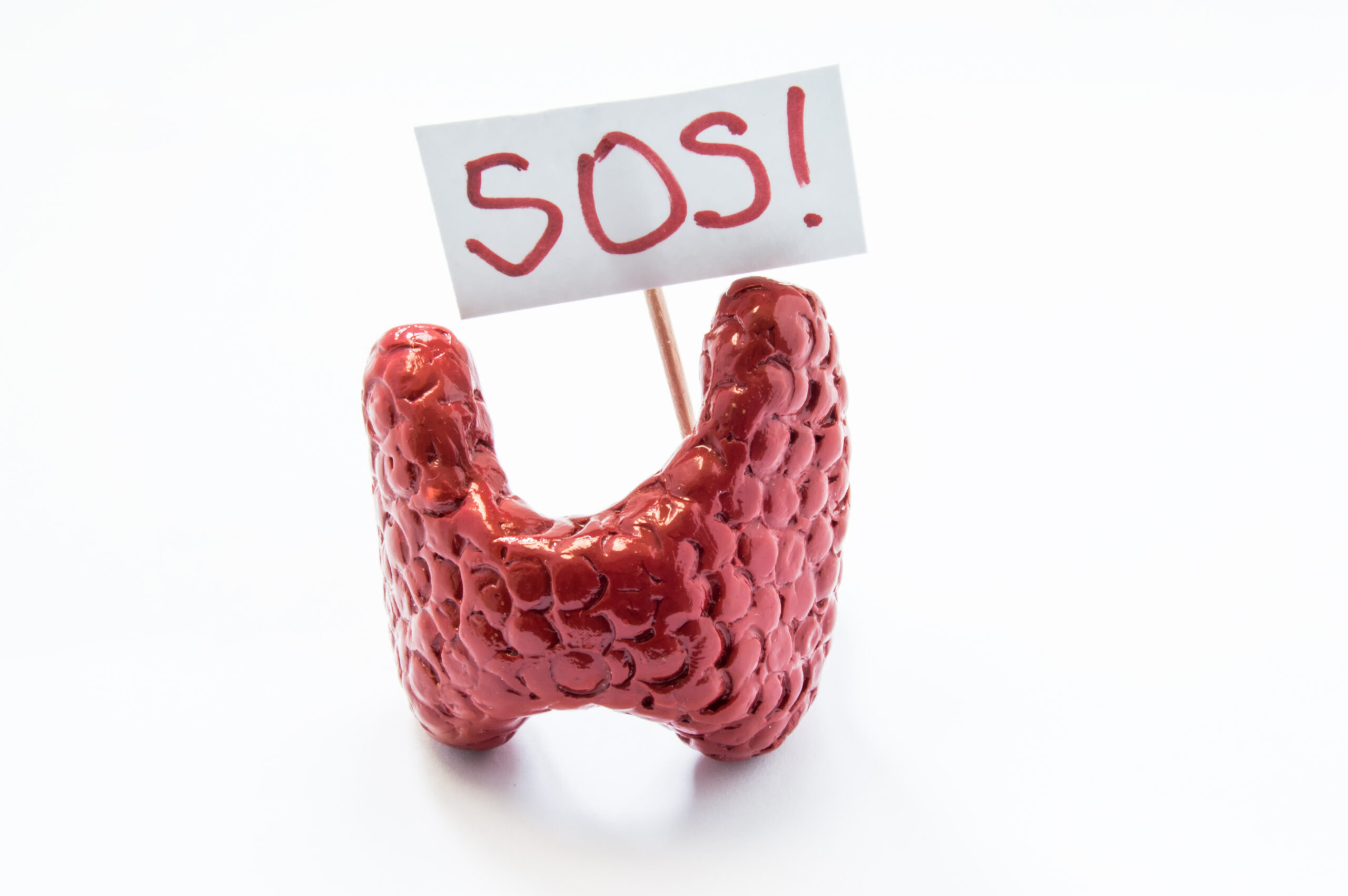Many many people who have been diagnosed with Hashimoto’s or Underactive Thyroid, end up online looking for more information on how to manage their symptoms, even if they are on thyroid replacement therapy.
And it’s quite shocking to me how much information online is old and hasn’t been updated or is disproven completely but is still being touted as hard fact.
In fact, this is such a bugbear of mine, that I thought I’d write about it here.
Some of the symptoms of low thyroid function include:
- Fatigue and brain fog
- Constipation
- Dry skin
- Sleepiness
- Muscle weakness and joint pain
- Depression
- Sensitivity to cold
Managing your Hashimoto’s disease would also be a lot easier if there wasn’t so much misinformation around. Here are the 3 Hashimoto’s myths I would love to remove from the internet, so you can be armed with the right info to look after yourself better.
#1 Iodine is ESSENTIAL for supporting the thyroid, especially if you have hypothyroid symptoms or function.
This is PARTIALLY true, but lacks individualisation.
A healthy thyroid needs iodine – it’s an essential ingredient it needs to create thyroid hormones. As your body can’t produce iodine, you need to ingest it through food.
Iodine supplementation should only be taken on advice from your doctor or specialist, as your need for it is determined by what type of thyroid dysfunction you’re dealing with. If you have AUTOIMMUNE Hashimoto’s thyroiditis, iodine in your diet can actually worsen your hypothyroidism (underactivity of the thyroid gland). It can even occasionally swing things back so that you’re also dealing with hyperthyroidism (overactivity).
Excessive iodine intake is an environmental factor for triggering thyroid autoimmunity. The long term effects of iodine on your immune system can trigger an autoimmunity. If you already have Hashimoto’s, an autoimmune disease of the thyroid, exposure to iodine can promote further oxidative stress and provoke further inflammatory reactions. Your thyroid is already being attacked by your immune system and the iodine causes more oxidative stress and destruction. This reduces your ability to create thyroid hormones.
The balance of iodine in your diet is important, because, while it is an essential part of the creation of thyroid hormones, if your intake is too low or too high it may lead to thyroid disease. One study discovered that iodine can change the natural cause of autoimmune thyroiditis, often resulting in a quicker progression towards hypothyroidism. In more encouraging news, another study shows that 78.3% of patients with hypothyroidism due to Hashimoto’s thyroiditis returned to a normal thyroid function when they restricted iodine consumption.
Iodine restriction can help decrease antibody levels and should be considered as one of the first options to take when faced with a new diagnosis of Hashimoto’s.
Following a low iodine diet does not have to be complex. Most iodine in western diets comes from ionised salt and other foods where iodine has been added. Foods naturally containing iodine include dairy, saltwater fish, and seaweed. And it’s crucial that while you avoid iodised salt, you also avoid any form of seasoning that may include seaweed, and any pre-packaged foods that list the following ingredients:
- Iodates and iodides
- Algin and alginates
- Carrageen
- Algar
- Calcium iodate
- Potassium iodate (often found in bread and other bakery products)
- Milk and products containing milk
- Seafood (freshwater fish is okay)
- Egg yolks
- Processed foods and foods from restaurants
- Soy products
- Vitamins and supplements that contain iodine
- E127 (red dye number #3, sometimes still found in cocktails and candied cherries but otherwise banned in the UK. It’s always worth checking labels of bright red foods – or simply cutting out anything that isn’t that bright naturally.)
The relationship between iodine and Hashimoto’s is complex – But if you know you have thyroid antibodies – it’s not recommended to supplement with iodine.
Please seek professional help with this if you feel like you need to take iodine for any reason.
Pregnancy with Hashimoto’s is an especially tricky intersection as iodine is critical for a healthy pregnancy and may be needed supplementally, but increasing thyroid autoimmunity is not great for pregnancy, so this needs to be handled carefully and by a professional who knows what they are doing.
#2 Goitrogens in Food Are Going to Make Your Hashimoto’s Worse
This one drives me crazy. Food containing goitrogens have received a bad rap for a while now.
In theory, goitrogens are substances that interfere with the production of thyroid hormones. They do this by blocking the iodine uptake in your thyroid gland. When this causes your thyroid to reduce production of thyroid hormone, your pituitary gland releases more thyroid stimulating hormone (TSH) in an attempt to trigger the release. But the TSH instead causes further growth of thyroid tissue, which can lead to you developing a goitre – an early sign of Hashimoto’s disease.
This can happen if your body ingests chemical goitrogens – including PCBs, nitrates, and various chemicals in cigarettes. So, when it was found that many foods contain goitrogens there was concern that this was a potential cause of goitre and eventually Hashimoto’s.
Foods that contain goitrogens include:
- Sweet potato
- Lima beans
- Linseed
- Rapeseed
- Millet
- Soy
- Cruciferous vegetables such as cabbage, kale, broccoli, cauliflower, broccoli, and turnip
But don’t cross them off the shopping list just yet!
Studies show that soy consumption has no effect on thyroid hormones. Another study demonstrates that broccoli sprouts have no effect on the serum levels of thyroid stimulating hormone and do not provoke autoimmunity of the thyroid.
In fact, cruciferous vegetables and other goitrogenic foods contain glucosinolates – a compound that your body needs to fuel the glutathione S-transferase enzymes that make up part of your microbicidal defence. These protect you on a cellular level from oxidative stress – something your reactive immune system can’t do. They also help block iodine uptake, which is useful for patients with Hashimoto’s.
The vegetables listed also contain a number of different vitamins and minerals, so it would be a bad idea to cut them out of your diet entirely.
So- while these foods do contain goitrogenic compounds, the quantity of them you would need to eat for them to be problematic far exceeds what is likely or even possible for you to eat from diet alone. AND excluding them cuts out beneficial compounds that are helpful or even protective for the thyroid.
#3 Going Gluten-Free or Making Changes to Your Diet Is Pointless if You Have Hashimoto’s Thyroiditis
Okay, I have to get on my soapbox for this one. This is one of the beliefs that drives me mad – I have seen so many of my clients reduce their symptoms and regain their lives from changing up what they eat, and improving their relationship with food.
The phrase you are what you eat is overused, but I really do think it stands up in the case of dealing with your autoimmunity. Whether you’re only experiencing slight symptoms, or you’ve got full blown autoimmune disease and loss of tissue, there are things within your control that you can do, so that you’re able to move on with your life, and not feel so lonely and in pain.
Often we tend to think of giving up gluten as being something only that people who have celiac disease or a gluten sensitivity need to do. However, as I’ve explored in other [articles], gluten is coming up again and again as something that many patients with autoimmunity should avoid.
In patients who have Hashimoto’s thyroiditis and celiac disease, a study discovered that a gluten free diet improves their absorption of thyroxine medication. In another study a group of women went gluten free for six months, and this helped reduce their thyroid autoantibodies.
Removing gluten from their diets also increased their ability to absorb 25-hydroxyvitamin d – vitamin D deficiency is linked with hypothyroidism.
Going gluten free can aid your gut health and reduce inflammation. And while it might feel tough, it’s a good idea to try out an elimination diet first, so you can check if anything else, such as dairy, might be affecting your gut health and worsening your Hashimoto’s symptoms.
Now let’s discuss lectins.
Lectins are found in pulses, nuts, grains, and some fruits and vegetables, and the reason they are not your friends is because they are agglutinins – they act like gluten in that they can clump together and form neoantigens.
If you have susceptible genetics, this can cause cross reactivity with your tissues by triggering an autoimmune antibody response – and it can also cause inflammation. Now, if you have Hashimoto’s on top of susceptible genetics, eating lectins can cause cross reactivity with your thyroid tissue, which can increase the destruction of your thyroid.
I recommended a simple elimination diet above, and you can include lectins in the list of foods to investigate. But once that phase is over and you’re ready to eat a wider range of foods, it may be helpful to start phased food reintroductions.
Other foods that have the potential to cross react with your thyroid tissue include:
- Nuts and seeds – such as almonds, cashews, macadamia, pistachio, brazil nuts, hemp seeds, peanuts, mustard seeds, amaranth, quinoa, sesame seeds
- Fruits and related products – citrus fruits, orange juice
- Vegetables – potato, corn, radish
- Cow’s milk
- Egg yolk
- Grains – buckwheat, barley, oats, sorghum, spelt,
- Seafood – tuna, scallops, raw salmon, clams, squid
- Tofu and soy
- Miscellaneous foods such as tapioca, chocolate, coffee
But – this does not mean you should automatically avoid these foods. I strongly advise against cutting out foods unnecessarily.
I do recommend running food immune-reactivity testing though because if you have Hashimoto’s antibodies AND antibodies to these foods then it might be necessary to cut them out permanently.
A diet high in salt can also cause issues for people with autoimmune disease. The easiest way in tackling this is by reducing your salt intake, but equally importantly, you need to make sure you consume some potassium alongside salty foods to counteract the effects of salts on your immune system.
There’s a lot of misinformation out there when it comes to Hashimoto’s disease, and I hope I’ve laid some of your concerns to rest about iodine intake and your diet. By far the most important thing to remember is that your disease and the way you ease your symptoms is individual to you.
There are many solutions you can find online for Hashimoto’s and thyroid immunity but there’s only one way you can feel better in yourself – and that’s by using trial and error to see what works for your individualised version of the disease. Controlling iodine and salt intake is one crucial piece of the puzzle, and an elimination diet followed by an [autoimmune paleo diet] can help form the corners and borders of the jigsaw. But it’s up to you to piece the rest together, using nutrition, careful supplementation, and good sleep hygiene.
If you’re at a loss with where to begin with your diet for Hashimoto’s disease, do book in to work with me and my team. We have helped so many people already work out how to eat to support their health and we’d love to help you too! You don’t have to go through tough times alone, no matter what the cause might be. You can learn how we can get to the root cause of your health problems with my Foundations of Health Program.
And if you’d like to stay up to date with my new blogs, recipes and recommendations: Sign up for my newsletter.






